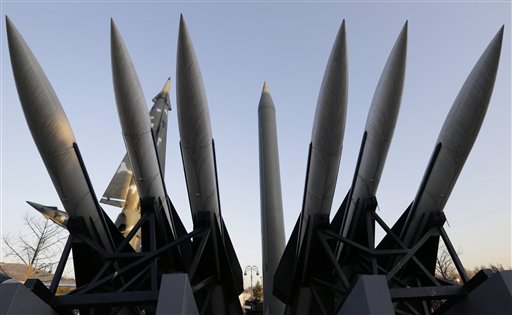Russia breaches nuclear missile treaty; US seeks response

In this Dec. 26, 2014 file photo, a North Korea’s mock Scud-B missile, center, stands among South Korean missiles displayed at Korea War Memorial Museum in Seoul, South Korea. AP
WASHINGTON, United States — Faced with rising pressure from Congress, a U.S. defense official said Tuesday that the Obama administration is pursuing ways to counter Russia’s violation of a key arms control treaty, but actions will be rolled into a broader response to Kremlin aggression in Ukraine and other parts of the world.
The U.S. announced last year that Russia is in violation of the Intermediate-Range Nuclear Forces Treaty that President Ronald Reagan signed with Soviet leader Mikhail Gorbachev in 1987. Russia has not acknowledged the violation, which dates to as early as 2008, or addressed concerns that U.S. officials have been raising with Moscow since 2013.
The treaty says the U.S. and Russia cannot possess, produce or test-fly a ground-launched cruise missile with a range of 300 to 3,400 miles (500 to 5,500 kilometers). Possessing or producing launchers of these type of missiles also is banned under the treaty, which helps protect the security of the U.S. and its allies in Europe and the Far East.
“The evidence is conclusive,” Brian McKeon, principal deputy undersecretary of defense for policy, told members of a subcommittee of the House Armed Services Committee. “Russia has tested this ground-based system well into the ranges covered by the INF treaty. We are talking about a real system and not a potential capability.”
Rep. Ted Poe said he has long asked the administration about how it would respond to the treaty violation. “How are we going to convince the Russians that we do mean business, if we do mean business? What’s the administration going to do to hold the Russians’ feet to the fire and hold them accountable?”
McKeon said the Joint Chiefs of Staff has conducted a military assessment of the threat posed to the U.S. or its allies if Russia were to deploy one of these cruise missiles in Europe or the Asia-Pacific region. Since then, defense officials have reviewed a range of military options. That review, he said, comes at a time when Russia is modernizing its military systems, destabilizing European security through its annexation of Crimea, battling Ukraine forces in eastern Ukraine and conducting airstrikes against U.S.-backed forces fighting against forces loyal to Syrian President Bashar Assad.
The goal, McKeon said, is not to make Russia an enemy, but to make sure its treaty violations do not leave Moscow with a military advantage over the U.S. or its allies. But he said that in light of recent aggressive behavior by Russia, the U.S. response cannot be solely focused on the treaty violation.
That provoked a response from Rep. Mike Rogers.
“My fear is that this set of responses that have been prepared a year ago for consideration are now going to get just blended into the new challenges that we have to face,” Rogers said. “And we’re going to get no action on the violations of the INF treaty. That is a longstanding violation that needs an appropriate response by this nation.”
McKeon offered only a broad outline of what new actions the Obama administration is pursuing and what additional activities it will seek congressional funding to implement. McKeon, who testified with Rose Gottemoeller, undersecretary of state for arms control and international security, promised to share more details with the lawmakers in a classified session that followed the public hearing.